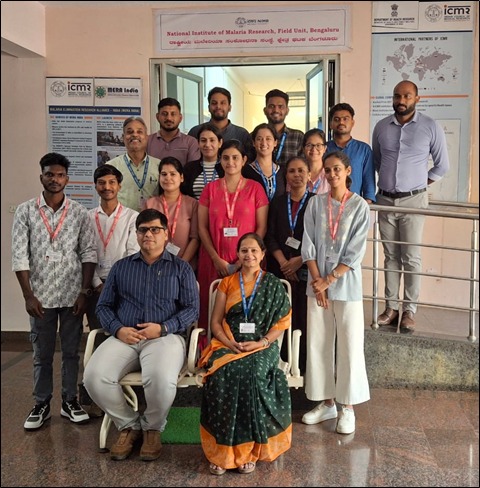ICMR-NIMR Field Unit: Bengaluru, Karnataka
Established in October 1992, the ICMR-NIMR Field Unit Bengaluru plays a pivotal role in malaria control efforts not only in Karnataka, but across India. The unit has been instrumental in designing, implementing and evaluating bioenvironmental strategies for malaria control across various eco-epidemiological settings.
The Field Unit serves as a hub for basic, operational and applied research on malaria and other vector-borne diseases. Its core mandate involves recommending and demonstrating suitable malaria control strategies that are adaptable to diverse ecological and epidemiological landscapes across the country. Research conducted at the field unit spans from fundamental biological studies to field-level implementation, enabling evidence-based solutions for disease prevention and control. The unit also provides technical expertise and capacity building to State Health Departments and public health professionals in domains of entomology, epidemiology and vector surveillance.
A critical part of the field unit’s work includes evaluating and validating vector control tools. In addition to its work on vector control tools, the field unit plays a significant role in testing the efficacy of new intervention strategies such as LLINs, diagnostic kits, novel drug regimens and improved methods for malaria diagnosis and treatment. The insights from these evaluations provide technical guidance to local health departments in the control and elimination of vector-borne diseases.
In recent years, the Bengaluru field unit has undertaken several major projects with intramural as well as extramural funding. One of the key initiatives was a national survey funded by GFATM–NCVBDC, which focused on community perspectives and health system assessments across 11 malaria-endemic states in India. The unit also carried out Phase III trials for three formulations of Natular larvicides against Aedes aegypti, Anopheles stephensi and Culex quinquefasciatus mosquito species in their natural breeding sites. Another achievement was the field unit’s involvement in Phase III trials of five LLINs (Miranet LN, MaGnet LN, Veeralin LN, Olyset Plus LN and TsaraBoost LN) in Nandyal district of Andhra Pradesh as part of a multicentric study carried out concurrently in Tanzania, Côte d'Ivoire and India.
The field unit also conducted a cohort study exploring the neurocognitive sequelae of non-severe malaria in adult patients, in which cognitive and executive assessments were conducted at baseline, 2nd and 8th month post-treatment. Alongside these projects, the unit performed WHO Tube and Bottle Bioassay to test insecticidal efficacy against key mosquito species such as Anopheles stephensi, Aedes aegypti and Aedes albopictus. Furthermore, the field unit extended its public health involvement and worked alongside ICMR-NITVAR to carry out a public acceptance study for the HPV vaccine among parents of girls aged 9–14 and young women in Mysore, Karnataka.
The Field Unit houses a well-maintained insectary, which supports its entomological research activities and maintains an average mosquito density of 300–500 mosquitoes. The unit also works in close coordination with the NCVBDC Department of Karnataka, and the scientists are presently part of the Internal Assessment Committee for district-level Malaria Elimination Certification. At present, the field unit is involved in multiple important projects which are mentioned below:
• Evaluating the diagnostic accuracy of malaria microscopy in private health facilities: a cross-sectional study in India. (EDA project)
• National survey for community Perspective Assessment and preventive strategies for Malaria control in selected Malaria endemic states, India. (HHS-II project)
• Deciphering macroclimate and microclimate variable effects on dengue and its vectors.
Extra activities conducted at field unit
Beyond its research mandate, the Field Unit is deeply invested in knowledge distribution and capacity building. Each year, the field unit conducts several impactful workshops on World Malaria Day, aligned with that year’s theme. The event serves to raise awareness, strengthen ongoing elimination efforts, and deliberate on the evolving role of the field unit in contributing effectively to the national malaria elimination agenda.
Specialized workshops are also conducted for Veterinary Assistants, Associate Professors and Field Unit staff, with hands-on sessions covering insectary, parasitology, and molecular biology laboratories.
The Field Unit also contributed to capacity building for malaria diagnostics by imparting the Refresher Training on Malaria Microscopy for Laboratory Technicians from Karnataka, Andhra Pradesh, and Telangana, conducted at ROH&FW, Bengaluru and Hyderabad. The training aimed to enhance microscopy skills for accurate malaria diagnosis and quality assurance under the national framework.
The FU currently employs project staff and interns. The unit is open to accepting more in its short- and long-term internship programs. We welcome applications from students or recent graduates, postgraduates, Ph.D./MPH and M.Phil. scholars with an academic background in Allied Science or Social Science subjects. We are also open for multi-sectoral collaboration.

